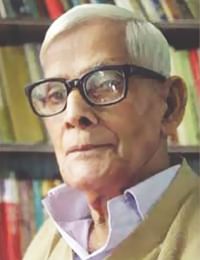Sardar Fazlul Karim passes away

Eminent scholar Prof Sardar Fazlul Karim breathed his last at a city hospital early today. He was 89.
Suffering from old age complications, he was admitted to the Intensive Care Unit of Samorita Hospital last evening. He died at 12:45am, said hospital sources.
One of the more prominent of teachers of Dhaka University and a foremost intellectual of the country, Prof Karim left behind a host of admirers and well-wishers to mourn his death.
Born in a lower-middle class family of Barisal in 1925, he led a simple and humble life. He stood second in the matriculation exams, topped the merit lists in both the BA (honours) and MA exams in first class at the philosophy department of the DU. At the age of 21, he became a lecturer at the university in 1946.
Sardar Fazlul Karim became involved in progressive politics while he was yet a student. Perceived by the then ruling classes as an enemy of the state of Pakistan, he spent almost the entire twenty-four years of Pakistani rule in prison in four phases.
Karim was elected to the East Bengal provincial assembly on a Jukto Front ticket in 1954 while in prison, but soon had to go underground once more when the ministry was dismissed three months after its it electoral triumph.
In the 1960s, Pakistan's first military dictator Ayub Khan and his loyalist Bengali governor of East Pakistan Abdul Monem Khan made sure that Karim could never return to teaching. He was, in their eyes, a subversive element.
A philosopher, translator, essayist and political activist, he participated in a 58-day hunger strike by political prisoners demanding humane treatment. As a communist, he made it clear that politics needed to be pursued at the grassroots if the masses were to matter in the state. There was in him a wonderful mix of Marxism, scholarship and humility. His work on Plato remains a point of reference for students of politics and philosophy in Bangladesh. And his conversations with the iconic Professor Abdur Razzaq are revealing of the broad intellectual canvas on which the idea of Bangladesh as a nation-state, indeed as a symbol of the richness of heritage, came to be based.
It was Bangabandhu Sheikh Mujibur Rahman and Prof Abdur Razzaq who ensured that Sardar Fazlul Karim returned to Dhaka University as a teacher soon after the liberation of the country.

 For all latest news, follow The Daily Star's Google News channel.
For all latest news, follow The Daily Star's Google News channel. 



Comments